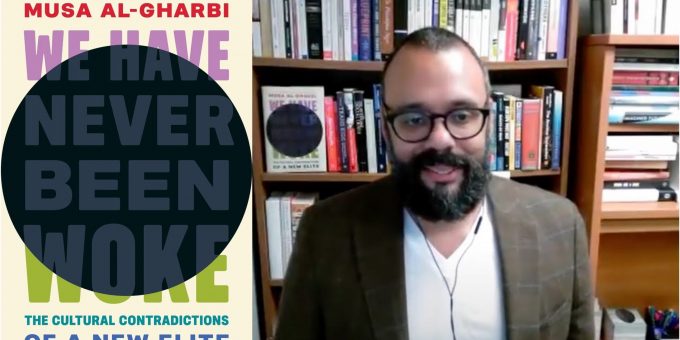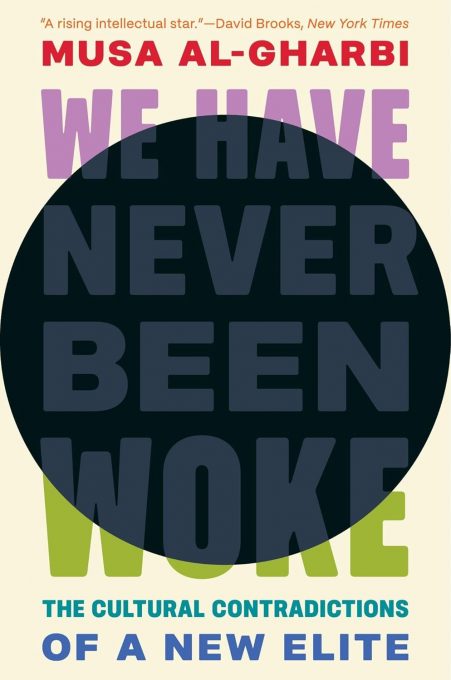
We Have Never Been Woke: A Q&A with Musa al-Gharbi
We are thrilled to welcome Musa al-Gharbi to the Contexts blog to celebrate the publication of his new book, We Have Never Been Woke: The Cultural Contradictions of a New Elite. In this post, blog editor Elena van Stee chats with Musa to explore the emergence of a new “woke” elite and the hidden ways they actively benefit from and perpetuate the inequalities they vocally oppose. They also discuss Musa’s commitment to avoiding academic echo chambers. You can watch the full interview above and find lightly edited excerpts from their conversation below.
Elena van Stee: Give us an introduction to the book. Tell us, what’s your central argument, and what are the key insights that you hope readers will take away?
Musa al-Gharbi: So, the puzzle the book is trying to figure out is that starting in the period between the world wars and accelerating in the 1970s, there were these shifts in the global economic order that favored people who work in the symbolic professions—people like academics and journalists, finance people and so on and so forth. People who manipulate symbols and data and ideas instead of providing physical goods and services to people.
 One thing that’s interesting about people like us is that, from the outset, a lot of our professions have been oriented around altruism and the common good. And so, what you might expect is that as people like us have increased in power—as we’ve gained more power over institutions, over the functioning of the government, over political parties, and as we have more wealth concentrated in our hands—what you might expect is that inequalities would be shrinking.
One thing that’s interesting about people like us is that, from the outset, a lot of our professions have been oriented around altruism and the common good. And so, what you might expect is that as people like us have increased in power—as we’ve gained more power over institutions, over the functioning of the government, over political parties, and as we have more wealth concentrated in our hands—what you might expect is that inequalities would be shrinking.
If you look at what has actually happened over this period as we’ve increased in power and influence, we’ve seen growing inequalities, economic stagnation, stagnation in terms of innovation, growing polarization, declining trust in institutions, and increasing institutional dysfunction. And so, the question that the book is trying to wrestle with is, “What’s going on here? Why do we see what we actually see instead of what we said we would see—and hoped we would see?”
The tweet-length answer to that question is that while it’s absolutely true that symbolic capitalists, the name that I give to these knowledge economy professionals, are deeply committed to social justice, we also very much want to be elites. We think it’s appropriate and normal—and we aggressively try to make it the case—that people take our opinions and preferences more seriously than those of a clerk at Stop & Shop, or a mechanic, or whatever. We think it is right, or appropriate, that our words carry more weight, that our preferences carry more weight. We think we deserve a higher standard of living than most other people. We want our children to have the same standard of living or even better.
And these two drives are in tension, right? The desire to be an elite and the desire to help the disadvantaged are in fundamental tension. You can’t really be an “egalitarian social climber,” right? It’s a contradiction in terms, and this tension has basically defined the symbolic professions from the beginning, including all the way through the present. And so that’s the short answer.
EVS: I want to ask you more about your approach to public engagement and to engaging readers with a wide variety of viewpoints. How do you speak so that people can hear you and are receptive to what you have to say?
MaG: I should say that when I first started writing for the public, I pretty much only wrote for left-leaning outlets. I didn’t even try to write for other outlets. […] When I guessed in my mind who would want to hear what I have to say as a Black Muslim intellectual, I thought, “Oh, most certainly only other people on the left.” But then I had this realization—which was motivated by being canceled by Fox News. I had this realization that if I want to convince people not to bomb Syria, it doesn’t do a lot [of good] if I’m writing in Al Jazeera to people who already think that bombing Syria is a bad idea—if I go preach to the choir, and we all go, “Yeah, yeah, we’re smart. We’re right.” That doesn’t do much. If you have any hope that your writing might in some way contribute to people not bombing Syria, you have to go to the people who want to bomb Syria and explain to those people, in a way that they’ll find persuasive, why bombing Syria is a bad idea.
And in order to do that, you have to speak to people in terms of their own values, their own narratives, and their own frames of reference. You have to speak to what they actually care about, what they’re actually driven by, and produce a picture of the world that they can recognize even if they don’t fully agree with it. Doing that takes some work, and it’s not as satisfying as doing the kind of cheerleading “Rah, rah, my own team is so great” kind of thing. Again, if we want to stop people from bombing Syria, we need to go to the people who want to bomb Syria.That’s obvious, but almost no one does it. And part of the reason why we [sociologists] don’t do that is because it’s just not satisfying in the same way. Although, there are other satisfactions: you can sometimes see people changing their minds. How often do you get to see that when you’re preaching to the choir? Never. And then I think the other thing that really inhibits a lot of sociologists from reaching across lines, reaching people who don’t already agree, is precisely the fact that you have to go where the fish are.
If I want to convince conservatives of something, I have to go to conservative outlets and spaces and talk to them. You can see this when you look at my own publication record. I have bylines in The Guardian, The Nation, The New York Times, and The Atlantic, but I also have bylines in National Review and The American Conservative. I think a lot of sociologists would rather their work be completely sterile than have bylines with their name on them in The American Conservative. They would rather not have an impact than—God forbid—have any of their colleagues even possibly perceive that they might be a right-winger.
I think this kind of concern with purity—with how other people perceive you in terms of having the right alignments, or whatever—these social concerns that we have about how our colleagues and peers will perceive us often prevent us from doing the kinds of things that would actually move the meter on issues we care about. If we think the work we do matters to solving social problems—if we want to lift people out of poverty, get people out of prison, and so on and so forth—we have to go and try our best to reach people who disagree with us and to convince policymakers and other stakeholders. But I think there are social dynamics within our profession that often discourage people from doing that when they otherwise could.
Musa al-Gharbi is an Assistant Professor in the School of Communication and Journalism at Stony Brook University. He is the author of We Have Never Been Woke: The Cultural Contradictions of a New Elite. Elena G. van Stee is a graduate student in the Department of Sociology at the University of Pennsylvania. The blog editor for Contexts, she studies culture and inequality, focusing on families, higher education, and the transition to adulthood.
